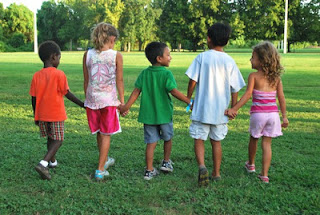In prior post, I’ve mentioned that my parents divorced when I was eight years old, and after that my mom started searching out everything in Israel that had anything to do with spirituality: meditation, different temples, different methods, everything. And she took me with her. So I was exposed to spirituality from a very young age.
That experience made me aware of how important it is for us, as parents, to actually open the door to spirituality for our children. I remember how I felt as a teenager, when I found the Kabbalah Centre and met other young people who actually talked about more than just clothes, or what party they went to last week. It was very comforting, and it gave me inner strength.
We always say that the future is in the hands of our kids, but the only way our kids are going to grow up to be adults capable of making a difference is if they are equipped with the right tools and the right consciousness. This is why it’s so important to start with kids when they’re young; when they’re especially open to new ways of seeing things. Because the soul is constantly evolving, souls coming down into the world in this generation are probably higher and more elevated than we are. We want to work with them as early as possible, before their Light begins to get covered over.
Today I’d like to focus on compassion. This isn’t easy to teach, but as always the very best approach is to model compassionate behavior in our own lives – especially when it comes to dealing with our own kids and their limitations. Even if my kid is challenged to act in ways that annoy me, and I’d like him to change, I can still show compassion, which means I can feel his pain. I can understand where he’s coming from. I can understand that I might not have this challenge, but he does.
I’ll give you a mundane example. One of my sons is really messy—he eats in a messy way, and he always get his clothes dirty—whereas I’m a very neat person. Few things are more annoying for a neat person than to have a messy child, right? But that’s what I have. That’s just the way some kids are. It’s in the DNA. I’ve found that neatness isn’t something you can teach; you can try, but if you have high standards you’ll be fighting that battle forever.
So I’ve learned something here–to have compassion when my kids don’t have the same skills that I do. They don’t see socks on the floor. They really don’t. One gift of having many kids is how clear it becomes that they’re not just reflections of you. Kids are born into this world with their own personalities, their own strengths and weaknesses, and their own potential to do great things. Everyone benefits when you can feel compassion for those more difficult qualities, that would otherwise be annoying.
Another good way to teach kids compassion is by showing it to people outside our family. If my friend is in trouble, and the kids hear me talking to another friend about why the first friend is such a drama queen, that’s not helpful modeling. They’d be much better off hearing you on the phone with a friend saying, “I feel for her. She’s in a difficult situation, and I’m talking with her to find out how I can help. Even if I can’t help in any practical way, I can sit with her in her unhappiness, and help her bear that pain.”
There’s no better way to teach compassion than to be compassionate ourselves. As Karen Berg likes to say, “It takes work to understand a person deeply, but there are great rewards awaiting you if you are willing to become a compassionate and understanding person.”

